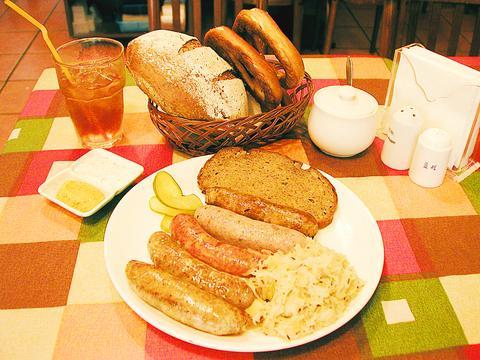In March, Taipei's two German restaurants called Schwarzwald -- one on Wenzhou Street, one on Yongkang Street -- parted ways and the Yongkang branch changed its name to Oma Ursel Cafe Restaurant and moved to Fuxing N Road, but retained its manager Chiu Dai-yu (邱岱玉) and the cooking staff, who have made it one of the few authentic German eateries in town over the past four years. The new name is a tribute to Chiu's German mother-in-law, whom she credits for teaching her everything she knows about German cuisine -- -- and one look at the menu will show that she's learned a huge amount.
Oma Ursel's tries to incorporate three elements of German food into its menu: home-style cooking of the kind taught by the restaurant's namesake, regional specialties and new flavors that have been incorporated into the national palette during recent decades. The result is a selection of dishes that is representative of current German cuisine without limiting itself to cliched Teutonic specialties.
Recently, Chiu has been enthusiastically promoting the restaurant's five choices of sausage, all of which are made on the premises. Less ambitious diners can choose two from among the bratwurst, cheese wurst, spicy wurst, white wurst and gyro wurst, or the brave can attempt all five. The stand-outs are the bratwurst and spicy wurst, while the gyro wurst in tatziki sauce is well worth a try to sample one of the flavors that Chiu said has become integral to German cuisine since the arrival of immigrants from Greece and Turkey.

PHOTO: MAX WOODWORTH, TAIPEI TIMES
Along with the sausages, diners eager for authentic fare should try the Wiener schnitzel, baked trout, or the chicken cordon bleu. This last dish is an absolute highlight, with plentiful cheese melted in the middle of the breaded, wrapped and fried chicken filet and pork. The cooks have deftly avoided over-breading to allow the flavors of the meat and cheese to come through while adding a pleasant crisp texture.
In the blazing summer months, when sausages and meats may be less appealing to some diners, the lighter fare on offer includes meal-size salads and a long list of vegetarian dishes, including the house's own vegetarian meatloaf, as well as light and low-priced lunch specials like spaetzle (fried homemade egg noodles) and seafood spaghetti. These go down especially well with a glass of Alsterwasser -- a half-and-half mix of beer and Sprite named for the lake in the center of Hamburg.
All of the restaurant's main dishes are served as set menus with decent portions of side orders that include sauerkraut, spaetzle, potato noodles or speck (braised potatoes, onions and bacon), salad, tomato and bacon soup, a slice of cake and coffee or tea. It's important to save space for the restaurant's homemade cakes, as no German meal would be complete without a slice, but you'll need the coffee (steer clear of the milk teas) or the remainder of your wheat beer to get down the apple tart, as it's quite dry.

This month the government ordered a one-year block of Xiaohongshu (小紅書) or Rednote, a Chinese social media platform with more than 3 million users in Taiwan. The government pointed to widespread fraud activity on the platform, along with cybersecurity failures. Officials said that they had reached out to the company and asked it to change. However, they received no response. The pro-China parties, the Chinese Nationalist Party (KMT) and Taiwan People’s Party (TPP), immediately swung into action, denouncing the ban as an attack on free speech. This “free speech” claim was then echoed by the People’s Republic of China (PRC),

Exceptions to the rule are sometimes revealing. For a brief few years, there was an emerging ideological split between the Democratic Progressive Party (DPP) and Chinese Nationalist Party (KMT) that appeared to be pushing the DPP in a direction that would be considered more liberal, and the KMT more conservative. In the previous column, “The KMT-DPP’s bureaucrat-led developmental state” (Dec. 11, page 12), we examined how Taiwan’s democratic system developed, and how both the two main parties largely accepted a similar consensus on how Taiwan should be run domestically and did not split along the left-right lines more familiar in

Specialty sandwiches loaded with the contents of an entire charcuterie board, overflowing with sauces, creams and all manner of creative add-ons, is perhaps one of the biggest global food trends of this year. From London to New York, lines form down the block for mortadella, burrata, pistachio and more stuffed between slices of fresh sourdough, rye or focaccia. To try the trend in Taipei, Munchies Mafia is for sure the spot — could this be the best sandwich in town? Carlos from Spain and Sergio from Mexico opened this spot just seven months ago. The two met working in the

Many people in Taiwan first learned about universal basic income (UBI) — the idea that the government should provide regular, no-strings-attached payments to each citizen — in 2019. While seeking the Democratic nomination for the 2020 US presidential election, Andrew Yang, a politician of Taiwanese descent, said that, if elected, he’d institute a UBI of US$1,000 per month to “get the economic boot off of people’s throats, allowing them to lift their heads up, breathe, and get excited for the future.” His campaign petered out, but the concept of UBI hasn’t gone away. Throughout the industrialized world, there are fears that